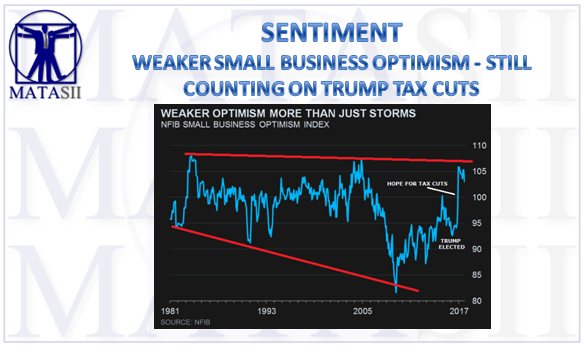WEAKER SMALL BUSINESS OPTIMISM - STILL COUNTING ON TRUMP TAX CUTS
-- SOURCE; 10-10-17 Bloomberg Intelligence.
Optimism among small businesses last month was docked by the recent hurricanes, similar to most of the economic data of late. However, based on the NFIB Index, weakness in September was also broad-based and not only concentrated in the regions affected by the storms.
Expectations for higher sales and an improving economy diminished, while a smaller share of small businesses thought it was a good time to expand, according to NFIB.
A different set of data — the ADP employment report for September — indicated small firms bore the brunt of the hurricanes as employment in the sector declined last month for the first time in more than four years. Small retailers in the impacted regions were hurt most. Thus, hurricanes Harvey and Irma were at least partially responsible for last month’s drop.
The hurricane impact should only be temporary. Underlying confidence among small business owners remains strong, boosted by expectations for lower taxes. Similarly, the impact on payrolls should prove to be temporary as well: BI expects a rebound to 325,000 in October from a 33,000 decline in employment in September.
The NFIB Small Business Optimism Index declined more than 2 points in September, falling to 103.0 from 105.3 in August. The reading came in below consensus expectations (105.0). The NFIB index peaked in January at 105.9 following an 11-point acceleration since October.
Despite last month’s drop, the index remains close to its cyclical high and near levels last seen in 2004. The headline index surged after the presidential election, propelled by expectations for the significant regulatory changes promised on the campaign trail. Small businesses remain optimistic about the tax reform prospects, however, the initial post-election optimism could have faded somewhat as a result of failure to repeal Obamacare.
In September, only three of the 10 components posted increases, while six declined and one remained unchanged. Small firms’ plans to increase payrolls and inventories improved. However, sales expectations plummeted and small companies deemed it was not a good time to expand, as the respective index also plunged last month.
Despite a modest increase in hiring plans, small business jobs activity faltered in September, with fewer owners trying to hire workers and more planning to cut positions. The tight labor market remains an extremely tough problem for small business owners, as they cannot find people with the skills to fill the jobs.
The October NFIB release will be more telling about whether this month's print was just a temporary weather-related stumble or a broader loss of confidence in legislative reform.




